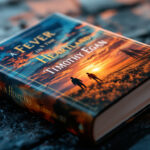Island of the Lost by Joan Druett: Survival, Leadership, and Humanity Reviewed
Survival stories often test the very edge of human strength, and Island of the Lost is no exception. Joan Druett takes readers to a desolate island on the brink of Antarctica, where two shipwrecks force strangers to confront nature and themselves. This true tale dives into themes of leadership, resilience, and the choices that define life or death. Perfect for fans of gripping nonfiction, this book raises one simple question: What would you do to survive?
Overview of the Story
Island of the Lost by Joan Druett tells a gripping narrative of survival against staggering odds. Set in the 1860s, this is no typical shipwreck story. The book explores not just one, but two simultaneous shipwrecks on Auckland Island, an isolated rock near Antarctica, and paints a vivid picture of resilience, luck, and leadership. Through the harsh elements and human personalities, Druett weaves a tale that leaves you reflecting on what it means to survive.
The Shipwrecks: Discuss the two parallel shipwrecks and how they set the stage for survival.
Two ships, The Grafton and The Invercauld, met disaster on opposite ends of Auckland Island in 1864. The crews faced parallel challenges, but their outcomes couldn’t have been more different. The Grafton, helmed by Captain Musgrave, fostered a sense of unity, leadership, and ingenuity among its survivors. They worked together to build shelter, secure food, and chart their rescue.
On the other side of the island, The Invercauld met chaos. Leadership faltered, morale dissolved, and cooperation was scarce. The result? A far grimmer tale of hunger, betrayal, and despair. The comparison between the two shipwrecks offers a stunning study in human behavior — how decisions under duress shape the line between life and death.
The juxtaposition of these stories in the same brutal environment speaks volumes. The stark contrast in survival tactics from both crews becomes a sharp lens through which Druett examines human determination and failure.
For further insight, you can check this review of Island of the Lost to explore how leadership unfolds in dire conditions.
The Auckland Island Setting: Describe the harsh environment and its impact on the characters’ struggles.
Auckland Island isn’t just a backdrop — it’s practically a character in the story. Imagine a place with relentless rain, bone-chilling winds, and barren landscapes. It’s a hostile, unforgiving place, with few resources to make survival easy. For both shipwrecked crews, nature was more than an enemy; it was the ultimate test of endurance.
The island’s isolation, located in the middle of the Southern Ocean, added layers to the struggle. With no chance for immediate rescue, the survivors had to rely entirely on themselves. Food sources were scarce — wild seals became a lifeline. Shelter was determined by what could be built or scavenged. Every day was a battle against exposure, starvation, and sheer hopelessness.
Want to get a picture of Auckland Island’s environment? This write-up gives a quick snapshot of its relentless challenges.
Through Druett’s masterful description, you can almost feel the biting cold and smell the salty winds. The environment magnifies every human weakness and every act of ingenuity, showing how small decisions can snowball into either survival or disaster. One small island, two disparate outcomes. That’s what makes this story unforgettable.
Key Themes and Lessons
The story in Island of the Lost masterfully illustrates the power of human will when circumstances are dire. At its heart, it reflects on how leadership and resilience can literally mean the difference between life and death.
Leadership in Crisis: Analyze the different leadership styles portrayed and their effects.
Leadership is a prominent thread woven through the survival stories of The Grafton and The Invercauld. Captain Musgrave of The Grafton emerges as a figure who embodies calm, rational, and cooperative leadership. He rallies his crew by fostering teamwork and creating structured plans. This wasn’t about commanding with an iron fist; instead, it was about listening, organizing, and inspiring confidence. Under his guidance, the crew members pooled their strengths and crafted tools, built shelters, and eventually escaped the island.
By contrast, the leadership—or lack thereof—on The Invercauld is a study in failure. Captain Dalgarno struggled to unify his men, leading to division, desperation, and moral collapse. The absence of a clear plan or cohesive vision became their undoing. When survival required cooperation, his crew disbanded into chaos. It’s a staggering reminder of how leadership in crisis isn’t just about authority—it’s about inspiring trust and action. Want to unpack what makes certain leadership styles thrive in crisis? This article highlights three styles that shine in tough circumstances.
Tough situations don’t call for one-size-fits-all leadership. But, as this story shows, those who embrace adaptability, empathy, and steady decision-making excel while others falter.
Survival and Resilience: Highlight the survival strategies and mental resilience of the stranded crews.
Survival is more than an instinct—it’s a skill, and both shipwrecked crews demonstrate this in powerful but divergent ways. On The Grafton, survival wasn’t left to chance. The crew, guided by Musgrave, tapped into innovation and decisiveness. They scouted and identified food sources, hunted seals, and spun animal skins into functional clothing. Hunger was combated with careful resource management and ingenuity. Shelter became a fortress against the elements, all thanks to their resourceful craftsmanship.
Equally critical was their mental resilience. With no hope of immediate rescue, despair could’ve crippled them. Yet, they set small, doable goals to keep themselves moving forward. It reveals an undeniable truth: survival isn’t just physical endurance—it’s about mindset and morale.
Conversely, The Invercauld sailors seemed overwhelmed by the island’s haunting desolation. A lack of leadership compounded their struggles, with many succumbing to hopelessness. Low morale eroded their ability to problem-solve or assist one another. Their experience underlines that, in survival, isolation can be deadlier than starvation.
For those intrigued by survival strategies in extreme settings, this guide dives into the mental frameworks that fortify individuals in life-or-death situations.
Through their separate survival stories, both crews remind us of one key takeaway: willpower and strategy are just as vital as physical resources.
Character Analysis
In Island of the Lost, character dynamics play a crucial role in the unfolding drama of survival. The behaviors, decisions, and leadership styles of the individuals greatly influence the fates of the shipwrecked crews.
Captain Musgrave: Focus on his role as a leader and key decisions that shaped their survival
Captain Thomas Musgrave stands out as the backbone of The Grafton crew during their ordeal. His leadership was rooted in empathy, clear communication, and a sense of shared responsibility. Musgrave prioritized maintaining morale while guiding his team through the harsh conditions of Auckland Island. He wasn’t tyrannical in his approach but fostered trust and collaboration.
Key decisions he made illuminated his leadership strengths:
-
Establishing Routine: He knew that routine could keep hopelessness at bay. He structured their days with specific tasks like gathering food, refining tools, and maintaining their shelter.
-
Encouraging Teamwork: Musgrave shared hardships equally with his crew, setting the tone for a cohesive group mentality.
-
Resource Management: From preserving food to crafting a functional boat for their eventual escape, his organized methods ensured survival.
Musgrave’s calm and decisive actions demonstrated that survival isn’t just about brute strength—it’s about planning and unity. His style of leadership is frequently regarded as exemplary in survival scenarios. For further insight into how his decisions were pivotal, this analysis of Musgrave as a leader provides more context.
Contrast with the Grafton Crew: Compare how the two groups approached survival differently
The survival tactics of the Grafton crew, under Musgrave’s command, contrast deeply with those of The Invercauld crew, who were stranded on the same island. These two groups faced nearly identical challenges, yet their outcomes were worlds apart.
The Grafton crew survived largely because of:
-
Unity: They operated as a cohesive unit where each member had defined roles and felt valued.
-
Proactivity: They hunted seals, crafted clothing, and even built their own escape vessel, showing incredible ingenuity.
-
Leadership: Musgrave instilled hope and focused on solutions rather than despair.
By contrast, The Invercauld crew had a vastly different approach:
-
Lack of Leadership: Captain Dalgarno failed to unite the men, leading to fractured trust and individual selfishness.
-
Neglect of Morale: Without a shared purpose, the crew succumbed to despair far faster than their counterparts.
-
Inaction and Dependency: Unlike the Grafton crew, they appeared to wait for external rescue instead of taking initiative.
To dive deeper into this fascinating comparison between the two groups, this write-up explains the differences in their survival strategies.
The juxtaposition of these crews’ experiences underscores the critical role of leadership and group dynamics in life-or-death situations. While one group worked together to overcome every obstacle, the other succumbed to disorganization and defeat, despite being separated by only 20 miles on the same island.
Writing Style and Historical Accuracy
Joan Druett’s Island of the Lost transforms a true survival story into an unforgettable work of nonfiction. Her ability to weave gripping narratives while staying true to historical detail sets her apart from many other writers. By striking a balance between storytelling and accuracy, she ensures readers are not only entertained but also educated.
Engaging Narration: Highlight how Druett keeps readers hooked through vivid descriptions and pacing
Druett knows how to keep her audience on the edge of their seats. Through her use of vivid imagery, each page feels like a scene unfolding in front of you. When describing the chilling environment of Auckland Island, she doesn’t merely tell you it’s cold or desolate—she shows it. You can feel the biting wind, hear the relentless crash of waves, and picture the ragged desperation of the characters.
Her pacing is another standout aspect of her writing style. Druett alternates between the struggles of the two shipwrecks in a way that keeps readers engaged. Just as you’re caught up in Musgrave’s ingenuity with The Grafton, the narrative shifts to the chaos and despair of The Invercauld. This structure maintains suspense while offering thought-provoking comparisons.
But what makes her narration truly shine is her ability to humanize the story. She dives deep into the personalities of the castaways without losing sight of the bigger survival tale. Readers don’t just learn what they did to survive—they feel their fears, frustrations, and triumphs. If historical nonfiction often feels dry to you, Druett’s storytelling might change your mind.
Historical Research and Authenticity: Explain how the book reflects real historical events and the depth of research involved
Druett doesn’t cut corners when it comes to historical accuracy. Every detail, from the tools the sailors used to the wildlife on Auckland Island, is painstakingly authentic. Her research is meticulous, evident in the way she captures the 19th-century maritime world. She draws from logbooks, firsthand accounts, and historical records to reconstruct events with a level of precision that’s hard to match.
She also doesn’t sensationalize the story for entertainment value. Instead, she respects the truth of what happened and brings it to life as it unfolded. This integrity adds weight to the narrative, reminding readers that this isn’t just a great story—it’s history.
Even the less glamorous aspects of survival, like what they ate or how they kept warm, are described in detail. These aren’t just footnotes; they’re integral parts of the story that deepen our understanding of life on the edge. Want to know more about Druett’s historical writing? This interview sheds light on her approach to blending storytelling with history.
Through her work, Druett bridges the gap between history and narrative, making Island of the Lost both educational and captivating. For any reader who craves not just entertainment but also insight into human resilience and historical events, her book delivers on all fronts.
Reader Takeaways
Joan Druett’s Island of the Lost is more than a survival tale—it’s a mirror reflecting humanity’s core instincts and the lessons we carry into our own lives.
Lessons in Humanity: Mention insights about human nature, cooperation, and survival instincts
At its heart, this book is a study of what makes us human. It explores how survival instincts clash and blend with the need to cooperate. On The Grafton, teamwork and shared goals brought the crew together, while The Invercauld revealed the darker side of isolation and mistrust. It’s a raw glimpse into what happens at the intersection of desperation and hope.
The two crews’ stories highlight an essential truth: humans survive better when they act as a collective. Cooperation isn’t just a strategy—it’s hardwired into us. When communities bond, even the harshest conditions become more bearable. Yet, as seen with the Invercauld, when this bond breaks, vulnerability increases, and chaos takes over. Why does this happen? Research provides fascinating insights, such as this article on why cooperation sometimes fails and how we can embrace it.
The book also underlines our need for purpose in survival situations. Captain Musgrave’s steady leadership gave his crew a reason to hold on and fight for another day. This sense of shared direction is as important as food or shelter. If you’ve ever wondered why humans thrive in groups versus alone, Island of the Lost offers answers by examining survival instincts under a microscope. For more on this topic, check out this discussion of human cooperation and its evolution.
Inspiration for Modern Readers: Talk about how these lessons apply to contemporary life challenges
Though most of us won’t face shipwrecks, Island of the Lost delivers wisdom that applies to everyday life. Consider the critical role of leadership—whether in a corporate office or a family, having someone who inspires trust changes outcomes. Clear vision and empathy, qualities Captain Musgrave embodied, are tools we all need today.
This book also teaches resilience. Life throws unexpected challenges, and while physical survival isn’t always the issue, mental endurance is. Much like the small goals kept The Grafton crew motivated, breaking down tasks into smaller, achievable steps can help us succeed during tough times. Interested in further tips on handling challenges? Take a look at survival lessons tailored for the modern age.
Lastly, this story is a reminder of how interconnected we are. From global crises to personal battles, working together—whether with coworkers, neighbors, or loved ones—often makes the impossible possible. Druett’s compelling narrative encourages us to re-examine our modern priorities. Are we building environments where cooperation thrives, or are we falling into silos like The Invercauld crew?
Survival isn’t limited to wilderness tales; it’s universal. The lessons found in Druett’s work carry beyond the page, pushing us to evaluate how we manage obstacles in a rapidly changing world.
Conclusion
Island of the Lost offers an unforgettable journey into the raw realities of survival. Joan Druett’s detailed storytelling and historical accuracy bring the 1860s shipwreck drama to life, making it a must-read for fans of history and adventure. Beyond the survival tactics, the story sheds light on leadership, human resilience, and the value of cooperation—a lesson that still resonates today.
Whether you’re a lover of history or enjoy gripping true stories, this book serves as a powerful reminder of what we’re capable of in the direst moments. If you’ve ever wondered how you’d endure the harshest conditions, Druett’s narrative will leave you questioning, reflecting, and inspired to appreciate the strength of the human spirit.







